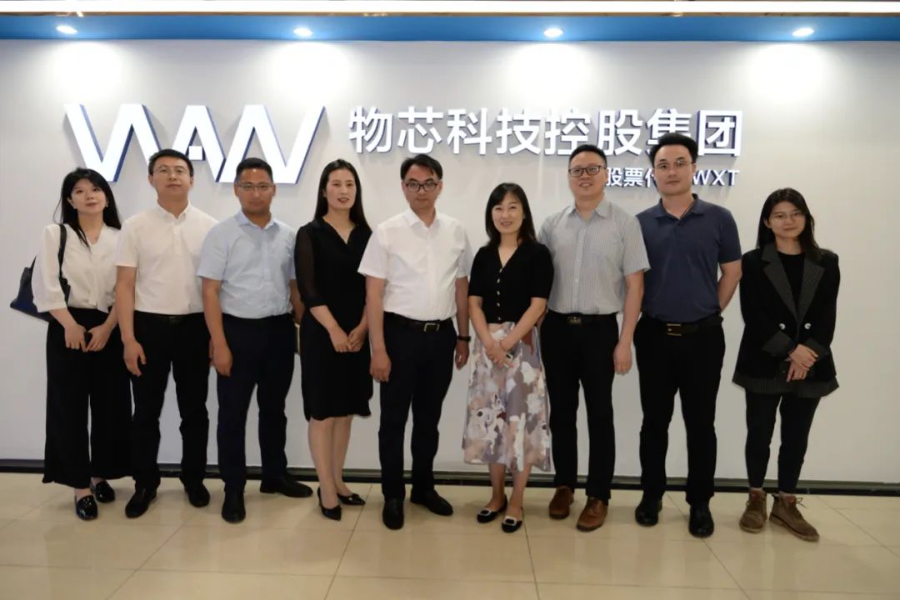Wuxin Tech Hopes IoT Focus Will Divert Attention from Chinese Roots in U.S. IPO Bid

The maker of chips used in internet-of-things devices is seeking a U.S. listing just as Chinese state-owned giants are pulling from the market amid China-U.S. tensions
Key Takeaways:
- Wuxin Technology is looking to raise up to $39 million in a New York IPO, joining a small group of Chinese companies still looking to tap U.S. markets despite frosty China-U.S. relations
- The company is in a sector strongly supported by Beijing, but is also vulnerable to risk from China’s broader efforts to tighten regulation of tech companies
By Warren Yang
Add Wuxin Technology Holdings Inc. (WXT.US) to a small group of Chinese companies that are still looking to tap the U.S. equity market, unfazed by frosty relations between Washington and Beijing. While the company may well deserve credit for its audacity, investors have lots of reasons to keep a wary eye on its stock – if it actually makes it to market.
Some might argue the company, which makes chips used in internet-of-things (IoT) devices, has filed for its New York IPO at possibly the worst time for such an endeavor by a Chinese business. A long list of U.S.-listed Chinese companies are currently facing delisting amid a long-running dispute between Washington and Beijing over a U.S. audit law for publicly traded firms. And intensifying China-U.S. tensions in general mean Chinese companies can always end up as collateral damage in the political arm wrestling between the two countries.
Wuxin is hoping to raise up to $39 million in gross proceeds by offering 6 million shares at $4.50 to $6.50 each in the IPO, according to its preliminary prospectus dated last Thursday. It plans to use most of the funds for research and development, as well as investment in things including technology infrastructure, branding and marketing.
Wuxin made its application just as five massive Chinese state-owned enterprises declared their plans to leave Wall Street. That group, including oil major Sinopec (SNP.US; 0386.HK) and China Life Insurance (LFC.US; 2628.HK; 601628.SH), said last Friday that they will apply to delist from the New York Stock Exchange.
Those five are among more than 150 companies named by the U.S. Securities and Exchange Commission (SEC) for failing to comply with U.S. auditing rules. Under the Holding Foreign Companies Accountable Act (HFCAA), which was passed in 2020, any company can be delisted if its auditors refuse to cooperate with SEC investigations. This means that nearly all U.S.-listed Chinese companies are at risk of delisting because Chinese authorities treat company audit data as state secrets and hence ban domestic auditors from sharing such information with foreign governments.
Washington and Beijing have been in talks to resolve this issue, but they have made little progress.
Wuxin is well aware of the risk of pursuing an IPO in the U.S. now. Running nearly 40 pages, the “risk factors” section of its prospectus is the longest part of the document and prominently features risks related to the U.S. audit law.
Wuxin says it’s safe for now because its auditor is an American firm under the purview of the SEC’s Public Company Accounting Oversight Board (PCAOB), unlike most U.S.-listed Chinese companies that use China-based affiliates of global accounting companies like Ernst & Young and Deloitte. But the company warns that it’s not completely off the hook. For one thing, if U.S. regulators are not pleased with the work of Wuxin’s auditor, TPS Thayer, the company could be subject to additional requirements.
Also, if the PCAOB determines that it can’t fully inspect TPS Thayer’s audits for any reason — say, because some documents are stored in China — then, Wuxin’s listing could ultimately be jeopardized. Wuxin notes that TPS Thayer, based in Sugar Land, Texas, has no branches or offices outside the U.S., even though the firm’s website lists an address for an office in China.
Popular pick
TPS Thayer appears to have become a popular choice for Chinese companies looking to list in the U.S. nowadays. Others using the auditor include Lichen China Ltd., a tax service provider that filed for a New York IPO in May, and Fuxing China Group, a producer of zipper sliders and chains, although neither company’s U.S. IPO plan has resulted in an actual listing yet.
Getting a U.S.-based accounting firm on board is one thing, but retaining it is another. For example, TPS Thayer resigned as the auditor for the recently listed medical device maker Meihua International (MHUA.US) in May. But then, Fuxing China, which is currently listed in Singapore and has been seeking a secondary listing in the U.S., turned to TPS Thayer after its previous auditor quit, partly because it had not been able to audit at the company’s premises in China.
There are also other potential headaches for the company. China has been stepping up scrutiny of technology companies in general, with data security being one of its focus areas. That kind of data security issue got another U.S.-listed Chinese IoT company, Tuya (TUYA.US), in trouble last year when a trio of U.S. senators raised concerns about its possession of large volumes of data on U.S. and other western companies. That said, Wuxin may be safe in this regard because it is simply a hardware maker and doesn’t engage in actual user data collection.
To the contrary, Wuxin is actually sitting in a sweet spot in terms of government support. Chinese IoT companies are benefitting from a government push to reduce the country’s reliance on foreign technologies and nurture home-grown ones. The nation is also aggressively promoting the development of a homegrown chip-making industry for similar reasons. China’s IoT market is projected to grow by a quarter to about $313 billion this year from 2020, according to third-party data in Wuxin’s prospectus.
Wuxin’s revenue grew about 48% year-on-year to $47 million in its fiscal year ended June 30, 2021, although the growth rate slowed to about 16% in the following six months. In another positive sign, the company is also profitable and has decent profit margins – not something that many chipmaking startups can boast.
At the midpoint of Wuxin’s target IPO price range, its stock would command a lofty price-to-earnings (P/E) ratio of more than 30 and a price-to-sale (P/S) ratio of about 4.7. That’s higher than the P/E of 13 for Japan’s Renesas Electronics (6723.T), but lower than Nvidia’s (NVDA.US) 49. U.S.-listed shares of Tuya, which offers IoT services but isn’t a hardware maker, are lower valued than what Wuxin is seeking, with a P/S ratio of 3.2.
The IoT industry’s potential not only in China but worldwide alone could justify such a valuation for Wuxin, which still derives more than 95% of its revenue from its home market. But when U.S.-China politics are added to the mix, pricing the company’s stock, or any Chinese firm’s stock for that matter, becomes much trickier.
To subscribe to Bamboo Works free weekly newsletter, click here






